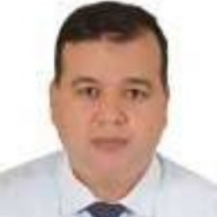
Anouar Darif
Work place: Laboratory of Innovation in Mathematics, Applications, and Information Technology, Polydisciplinary Faculty, Sultan Moulay Slimane University, Beni Mellal, 23000, Morocco
E-mail: anouar.darif@gmail.com
Website:
Research Interests: Neural Networks, Cloud Computing, Internet of Things, IoT
Biography
Anouar Darif received the bachelor in IEEA (Informatique Electrotechnique, Electronique and Automatique) from Dhar El Mahraz Faculty of Sciences at Mohamed Ben Abdellah University Fez, Morocco in 2005. He received the Diplôme d’Etudes Supérieurs Approfondies in Computer Sciences and Telecommunications from Faculty of Sciences Rabat in 2007. He received the Ph.D. degree in Computer Sciences and Telecommunications from Faculty of Sciences of Rabat in 2015. He is currently a Research and a Teaching Associate in Multidisciplinary Faculty at University of Sultan Moulay Slimane Beni Mellal, Morocco. His research interests include Wireless Sensor Network (WSN), Mobile Edge Computing (MEC), Internet of Things (IoT), Cloud Computing and Neural Networks. Anouar Darif is an active reviewer of various international conferences and journals.
Author Articles
Quality of Experience Improvement and Service Time Optimization through Dynamic Computation Offloading Algorithms in Multi-access Edge Computing Networks
By Marouane Myyara Oussama Lagnfdi Anouar Darif Abderrazak Farchane
DOI: https://doi.org/10.5815/ijcnis.2024.04.01, Pub. Date: 8 Aug. 2024
Multi-access Edge Computing optimizes computation in proximity to smart mobile devices, addressing the limitations of devices with insufficient capabilities. In scenarios featuring multiple compute-intensive and delay-sensitive applications, computation offloading becomes essential. The objective of this research is to enhance user experience, minimize service time, and balance workloads while optimizing computation offloading and resource utilization. In this study, we introduce dynamic computation offloading algorithms that concurrently minimize service time and maximize the quality of experience. These algorithms take into account task and resource characteristics to determine the optimal execution location based on evaluated metrics. To assess the positive impact of the proposed algorithms, we employed the Edgecloudsim simulator, offering a realistic assessment of a Multi-access Edge Computing system. Simulation results showcase the superiority of our dynamic computation offloading algorithm compared to alternatives, achieving enhanced quality of experience and minimal service time. The findings underscore the effectiveness of the proposed algorithm and its potential to enhance mobile application performance. The comprehensive evaluation provides insights into the robustness and practical applicability of the proposed approach, positioning it as a valuable solution in the context of MEC networks. This research contributes to the ongoing efforts in advancing computation offloading strategies for improved performance in edge computing environments.
[...] Read more.Other Articles
Subscribe to receive issue release notifications and newsletters from MECS Press journals